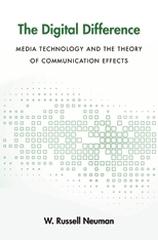The Digital Difference examines how the transition from the industrial-era media of one-way publishing and broadcasting to the two-way digital era of online search and social media has affected the dynamics of public life.
In the digital age, fundamental beliefs about privacy and identity are subject to change, as is the formal legal basis of freedom of expression. Will it be possible to maintain a vibrant and open marketplace of ideas? In W. Russell Neuman's analysis, the marketplace metaphor does not signal that money buys influence, but rather just the opposite'that the digital commons must be open to all ideas so that the most powerful ideas win public attention on their merits rather than on the taken-for-granted authority of their authorship.
Technologies by their nature do not cause freedom nor do they limit it. Technologies are embedded in a complex set of cultural expectations and institutions as well as regulatory and legal principles. Fear of the 'communication effects' of 'bad ideas' is the enemy of free speech. Neuman traces the digital difference from the era of propaganda studies and concerns about Big Brother to issues of information overload and the core policy debate about Internet network neutrality.

(0 Comentarios)